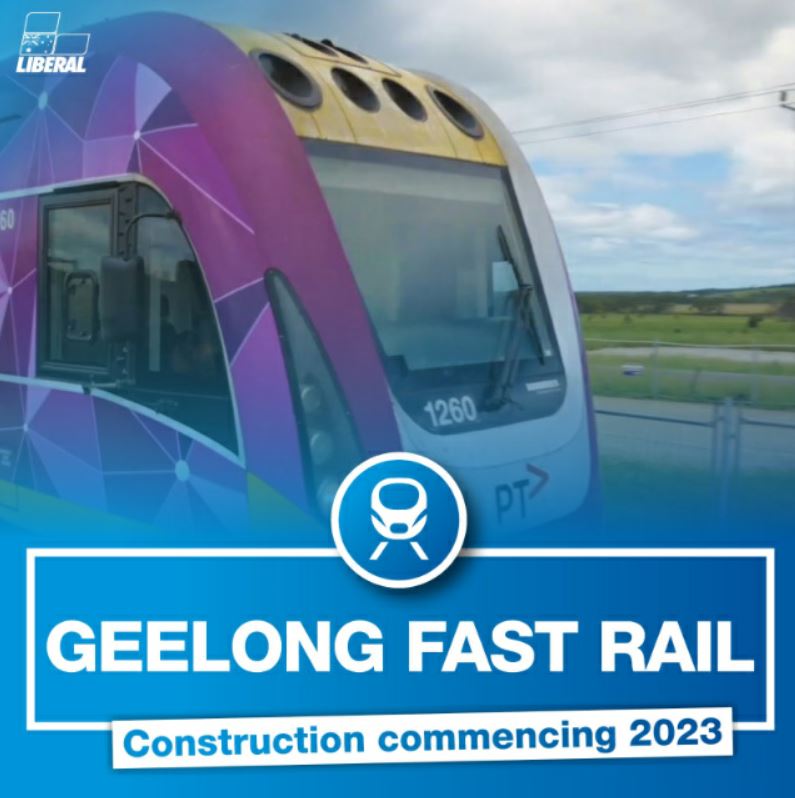JMR WITH PRIME MINISTER MORRISON, MINISTER FOR INFRASTRUCTURE McCORMACK AND CITIES AND URBAN INFRASTRUCTURE MINISTER TUDGE
Australia’s first faster rail corridor between Melbourne and Geelong will strip 15 minutes off the travel time and mean a congestion free commute to and from Melbourne’s CBD.
Today’s announcement comes after the Australian and Victorian Governments agreed to commit $2 billion each to the project.
Prime Minister Scott Morrison and Premier Daniel Andrews revealed Stage One of the Geelong Fast Rail project, which will deliver passengers faster journeys between Geelong and Melbourne, with a travel time of around 50 minutes.
Construction of Geelong Fast Rail is expected to be underway from 2023, subject to relevant planning, environmental and government approvals. It will support over 2800 jobs during construction.
Prime Minister Scott Morrison said the plan would deliver a major boost for the fast-growing city of Geelong where the population is expected to grow by almost 50 per cent in the next 30 years.
“We want commuters to spend less time travelling and more time with loved ones and the faster rail corridor provides a better transport link for urban and regional communities,” the Prime Minister said.
The works will include track upgrades between Werribee and Laverton, including a new dedicated express track that will create a faster route for Geelong services.
It is the shortest and most direct rail line between Geelong and Melbourne, approximately 8 kilometers shorter than the current route that travels through the western suburbs via Sunshine.
Running Geelong services on the Werribee corridor also frees up room for more trains to Melbourne’s west, including Wyndham, Melton, Ballarat and Bendigo that run on the Sunshine corridor.
Some Geelong services will continue to run on the existing corridor for increased frequency, choice and the quickest connection with the new Melbourne Airport Rail line.
Premier Daniel Andrews said faster rail would mean Victorians could spend less time commuting and more time with the people they love – and that he was proud to be delivering for Geelong.
The Victorian Government will invest $2 billion in the Geelong Fast Rail project – matching the Australian Government’s $2 billion contribution to the project.
“When we make a promise, we keep it. We will deliver faster services to Geelong – and shovels will be in the ground in just a few years.”
Deputy Prime Minister and Minister for Infrastructure, Transport and Regional Development Michael McCormack said continued infrastructure investment was at the heart of the Federal Government’s economic recovery plan.
“Every dollar we spend on infrastructure is a dollar invested in local jobs, local businesses, local industries and local communities,” the Deputy Prime Minister said.
“This nation-building infrastructure will ensure commuters can get home sooner and safer, increasing the liveability of the entire Geelong region.”
Federal Minister for Population, Cities and Urban Infrastructure Alan Tudge said Geelong Fast Rail was the first part of the Federal Government’s 20-year faster rail plan.
“This is a critical route for faster rail which will make a huge difference for thousands of Victorians,” Mr Tudge said.
“When all stages are completed the time from Geelong to Melbourne will be just 40 minutes.”
Minister for Transport Infrastructure Jacinta Allan said the project will deliver better services and support thousands of jobs.
“Geelong Fast Rail Stage 1 will deliver more frequent and reliable services for one of our biggest cities – creating more jobs and access to services for locals.”
The plan builds on more than $1 billion of work already underway to improve services on the Geelong corridor including the Waurn Ponds Station Upgrade, the South Geelong to Waurn Ponds Duplication and Waurn Ponds Stabling.
Both governments will continue to work together on detailed planning and technical investigations to inform a business case for the first stage, as well as scoping future investments for the Geelong corridor which will further reduce travel times.
21 November 2020

